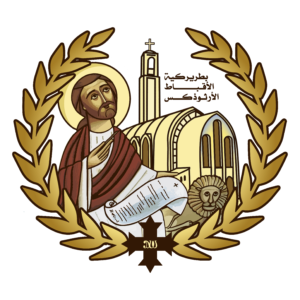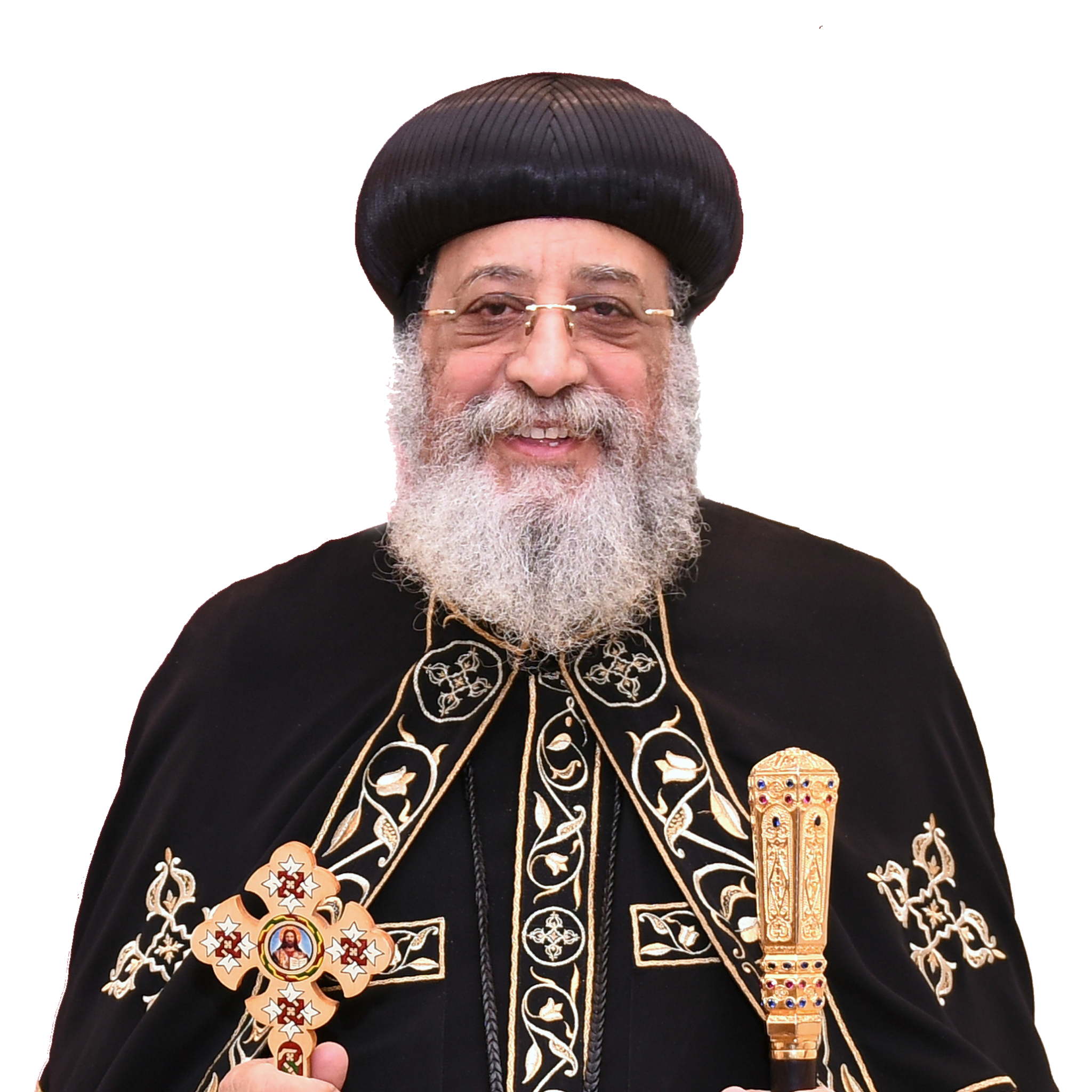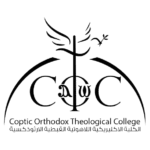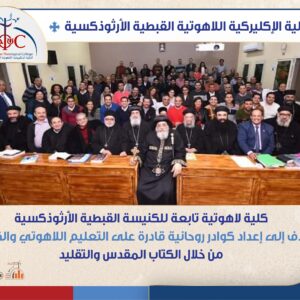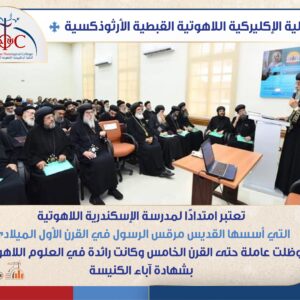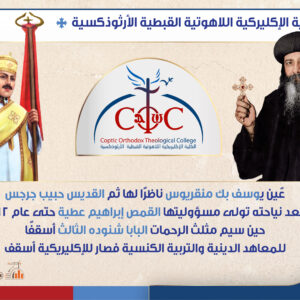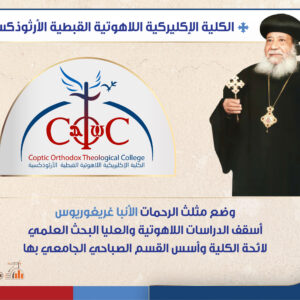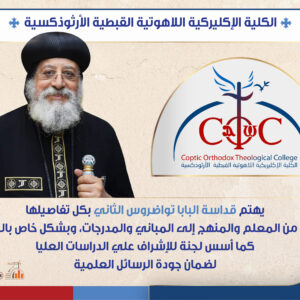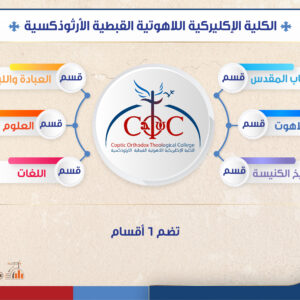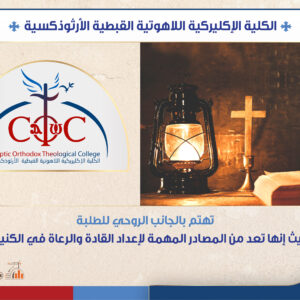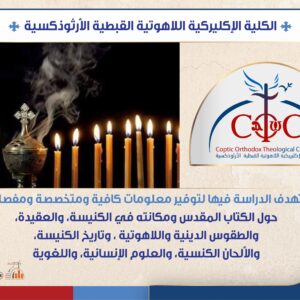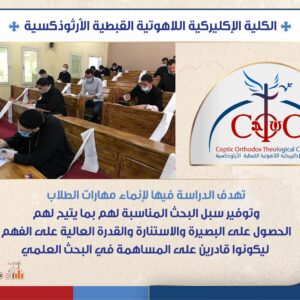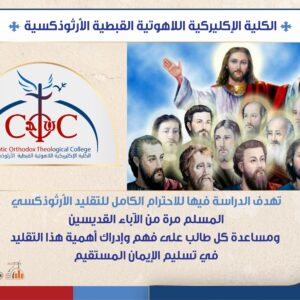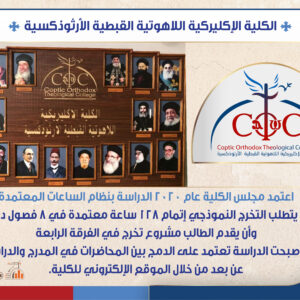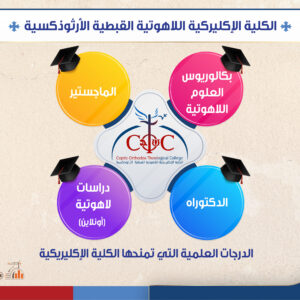The Clerical College is an important center of education for preparing consecrated men and priests. To the Church, it is like the spine that holds up the body.
Ancient and Modern History of the College
Saint Mark, one of the Seventy Apostles, placed the cornerstone for this great building; he is the preacher of the land of Egypt, and he left it three jewels: (1) the Gospel of St. Mark, (2) the Anaphora that is attributed to Pope Cyril, and (3) the Theological School. St. Justus was a scholar and the first dean for the Theological School, and he became the sixth patriarch to sit on the St. Mark’s Throne. St. Eumenius was appointed dean, and when he became the seventh to sit on St. Mark’s Throne, he appointed Markianos dean, who then became the eighth Patriarch. Many graduated from this school, such as: the 17th Pope Peter I (Seal of the Martyrs), the 18th Pope Achillas (Archelaos), the 20th Pope Athanasius I (The Apostolic), and the 22nd Pope Timothy I. The theological studies that were handed down through Apostolic Succession were preserved through this school.
However, teaching in the school was disrupted due to the Chalcedonian schism in the mid-fifth century AD, and it moved from Alexandria to monasteries in Lower Egypt, and particularly the Monastery of St. Macarius, which is considered the legitimate heir of the Clerical College.
Restoration
110th Pope Kyrillos IV (1853–1862 AD)
Pope Kyrillos IV, known as the Father of Reform, paved the way for establishing a clerical school for men since he also established a clerical school for clergy. In the beginning, he held weekly meetings (on Saturday) at the Azbakeya school; with the knowledge of Hegumen Fr. Girgis Dabee (priest of Church of El-Malak El-Bahary Monastery—“Archangel Michael Monastery), he urged them to read, learn, and research, and the Pope was often present. Then he established a clerical school in Faggala in 1862, and yet it did not last.
-
112th Pope Kyrillos V (1874–1927 AD)
Pope Kyrillos V was interested in education, especially in the monastic life. On Friday, Toba 22, 1591 AM, January 29, 1875 AD, he established a clerical school in Cairo for youth, priests, and monks, and entrusted its management to Hegumen Fr. Philotheos Ibrahim Alam Al-Din who was a well-known theologian. In the beginning, it was hosted within the Patriarchate in Azbakeya, and due to special circumstances, learning was disturbed for a period that lasted for a few months. Then, learning continued as of Wednesday, Hatoor 21, 1610 AM, November 29, 1893 AD, in Faggala, also during the papacy of the Pope Kyrillos V who assigned its administration to Youssef Bek Menkrious and Habib Girgis (the most pious man and most knowledgeable in Orthodoxy). Both were teachers at first, then the first was appointed to be dean, after his departure, St. Habib Girgis became dean. Since that date, the march has continued without stopping.
The Pope also urged monks to study and read in the holy Scripture, in which he established schools in monasteries—in the Monastery of Al-Baramous, in St. Antony’s Monastery (in the monastery’s church in Ezbet Boush), and in the Monastery of Al-Muharraq.
The Pope sent St. Habib Girgis the Archdeacon on a journey to collect donations to implement some planned projects. He collected 11,000 Egyptian pounds, half of which came from monasteries and bishops, and the other half from the people. As soon as the Pope received this amount, he purchased a luxurious and large residence in Mahmasha, Cairo, in 1904 AD, due to its proximity to a railway station so that students from Upper Egypt could easily travel from and to it. Since the residence was not equipped for teachings, the school was returned to the Patriarchate for a third time until it settled in the Mahmasha location in 1918 AD, until 1951 AD when it was moved to Anba Rewis Monastery, where it still exists today.
Moreover, during the Pope’s papacy:
- He appointed Ekladius Labib as a teacher for the Coptic language urged him to publish a Coptic-Arabic dictionary. The college began to release a monthly magazine from 1901-1904 AD that included topics about culture, antiquities, and the society
- He send seven monks to study in Athens Theological College
- The Ministry of Education ordered for the subject of the Christian faith be taught in public schools as requested by the Pope who asked for the teaches to be graduates of the Clerical college
- The Association of the Sons of the Seminary to provide communication between the college, the students, and the graduates
- The Association submitted a memorandum to the Ministry of Education, and to Abd Al-Raziq Al-Sanhouri Pasha and Dr. Taha Hussein, requesting to exempt the seminary students from Armed Forces service as it is for Al-Azhar students and graduates
115th Pope Yousab II (1946–1956 AD)
- The Religious Council ordered to raise the status of the seminary to be a “college” instead of a “school,” and approved an annual budget of 3,000 Egyptian pounds
- A Board of Directors was establish made up of the Metropolitan of Manfalot, the Metropolitan of Asyut, the Bishop of Sharqeya, Habib El-Masri, Ibrahim Tekla, and Fahim Soliman
- The Pope appointed Hegumen Fr. Ibrahim Attia, priest of St. Anthony’s Church, Shobra, a dean from August 22, 1951 to September 29, 1962
116th Pope Kyrillos VI (1959–1971 AD)
Pope Kyrillos VI ordained Hegumen Fr. Antonious Al-Soryani a bishop for religious institutes and Church education as His Grace Bishop Shenouda, who was then chosen to be the Patriarch of the Church in November 14, 1971. He also ordained Hegumen Fr. Bakhom Al-Muharraqi as His Grace Bishop Gregorius, General Bishop for Higher Theological Studies, Coptic Culture and Scientific Research in 1967, and the college was in Mahmasha at the time.
The university evening section was established in 1945 by Dr. Wahib Atallah Girgis (the Late Bishop Gregorius), the Associate Dean of the College at the time, who wrote the college bylaws in 1959 and established the day section.
117th Pope Shenouda III (1971–2012 AD)
Pope Shenouda III established a branch for the seminary’s day section in the Monastery of St. Mary, El-Muharraq in 1973, and transferred the intermediate section, which accepted students with a middle-school certificate and had a 5-year program, from the headquarters in Anba Rewis, Abbasiya, Cairo, to the Monastery of the St. Mary, El-Muharraq. Then in 1984, the intermediate section was discontinued, and the higher section continued to be offered in the monastery.
The Pope established 12 branches of the evening section in Alexandria, Tanta, Beheira, Menoufia, Port Said, Mahalla, Shubra Al-Khaimah, Minya, Al-Balyana, and Luxor, as well as abroad in New Jersey and Los Angeles, where candidates for the priesthood, and qualified men and women studied many Christian sciences such as theology, history, Coptic language and Coptic art.
118th Pope Tawadros II (2012–Present)
His Holiness Pope Tawadros II, the 118th Patriarch, cared greatly for the college as it is His Holiness’ desire to raise the level of education and scientific research in theological and ecclesiastical studies. His Holiness worked on the organization and edification of the inner structure of the college by:
- Appointing professors with academic degrees (MA and PhDs), and encouraging teachers to pursue higher studies, thus, establishing a department for graduate studies in the college
- Holding an annual conference for the college’s faculty members in all the branches with the aim of connecting and unifying the general vision of the seminary, and developing skills in teaching methods, evaluation methods, and examinations
- Holding an annual conference for students (10 students from each branch), to discuss a contemporary issue so that each student is aware of what is happening in the community
- Caring for the academic building and the dormitory—both were renovated, and their furniture upgraded
- Modernizing the computer lab and creating a state-of-the-art language lab
- Giving care to libraries as the seminary library was renovated, and a special annual budget was set for it to obtain new publications
Study in the Seminary
The Seminary offers a 4-year-program that grants students a Bachelor of Theology degree after completion. In addition to studying, the day section students participate in a daily spiritual program made up of agpeya prayers, reading and liturgies, referring to learning in the spiritual and the scientific aspect.
The first year is considered a probationary year in which a student is permanently dismissed from the college if they fail. For the subsequent years, in the day section, a student may remain to repeat up to three classes if they fail, and up to five classes in the evening section.
The college considers greatly each student’s behavior and perseverance. Those who do not achieve the required grade are not allowed to take final exams, yet they have an opportunity to return and repeat the year, to be a good role model that qualifies him to be a servant responsible for people.
As for the college’s attendance policy, there is a required 90% attendance rate for the day section, and 75% for the evening section. This is required for the final exams of each graduating class.
A student studies subjects such as the Bible, sayings of the Fathers, theoretical, dogmatic and spiritual theology, literary and comparative theology, history of religions, New and Old Testaments interpretations, in addition to the sciences of preaching, praises, hymns, personal status, Coptic, English, Greek, Hebrew and Arabic, psychology, sociology and philosophy.
General Requirements (Day and Evening Sections)
- Must be Coptic Orthodox with a testimony by their father of confession with a clear recommendation
- Must not have any judgements against them, criminal or ecclesiastical, that affect reputation or behavior
- Must have a BA degree or postgraduate diploma from a college, university, or institute that is accredited by the Ministry of Higher Education
- Must pass the personal, oral, and written tests
Specific Requirements for the Day Section only:
- Must obtain a written recommendation from the metropolitan or bishop of the diocese the person belongs to, recommending them to enroll in the college to then serve in that diocese after graduation
- Must fulfill the National Military service or provide proof of permanent exemption
- Must not be older than 27 years old as of October of the enrolling year
- Must not be married or engaged at the time of enrollment and continues to not be throughout the program
- Must reside in the dormitory
College Vision
The Clerical College in Egypt offers the most distinguished theological learning at the local level in preparing theologians and priests, achieving religious leadership, and consolidating orthodox thinking in doctrine, worship, ecclesiastical history and contemporary issues, whether educational, social and religious—in addition to theological research and its application, and service to the individual and society.
College Mission
Preparing and training orthodox theologians and priests that are distinguished, creative, qualified, and able to interact with the society, as well as its new ideas, trends, issues, circumstances and factors, whether social, technological or theological, and encouraging theological research by upgrading preparation and training programs whose results appear in the progress of the Church community in all spiritual and humanitarian aspects. The college also tries to use educational methods and techniques, and evaluation methods that help advance and develop thinking among the learners, as well as that which helps them care for the congregation on all levels, with an enlightened pastoral thought.
College General Goals
In consideration of the vision and mission previously mentioned, the college seeks to accomplish the following general goals:
- Preparing graduates of various universities, institutes, and colleges for service, learning and research; and working on perfecting the learner’s personality and developing his or her spirituality, intellect, and ideology
- Enhance the learning and theological state of all servants, especially the clergy
- Preparing church specialists and leaders in various theological and biblical aspects
- Providing new faculty members who are capable of adapting to learning and societal developments, and achieving the Clerical College’s mission
- Conducting research and studies in the different topics of specialization, and offering technical advice for such topics and for issues in Church teachings and educational curricula, and publishing the results of research and studies that are related to theology and Scripture
- Contributing to the development of theological and educational thought and its applications in solving problems in the church environment, and local and regional society
- Holding and organizing local, regional, and global seminars and conferences in the various topics of theology
- Participation in local, regional, and global seminars and conferences in the various topics of theology
- Providing spiritual, social, and educational psychological counseling to organizations and individuals
- Sharing experiences and information with Egyptian and global religious, educational, and cultural, organizations and institutions
- Resolving religious and educational problems in the local environment, and in society in general
- Signing agreements of scientific and cultural importance with various countries in the world, resulting into religious missions and other opportunities of cooperation
- Meeting the needs of the Church community to achieve spiritual and doctrinal development by awarding postgraduate diplomas, and BA, MA, and doctorate degrees in theology
Panoramic View
Inside the walls of St. Mark’s Cathedral at the Anba Rewis complex, Abbasiya, Cairo, there stands the Clerical and Theological College—a two-story, E-shaped building that includes four large classrooms next to the administration wing, rooms for faculty members (one for each department), as well as a state-of-the-art language lab and a computer lab. It also includes a church named after St. Pope Kyrillos VI and St. Habib Girgis the Archdeacon. Adjacent to the building is a garden that has a ping pong lounge and the Anba Rewis club is available to seminary students two days a week. In addition to the main building, there is a private dormitory for the day section that includes the students’ rooms, private rooms, a chapel for the spiritual program, and a cafeteria. All buildings were renovated, and furniture was replaced during the papacy of Pope Tawadros II.
Seminarian Spiritual Life
The spiritual life is the spring for priestly life and the basis of communal life and service. Therefore, the seminary stressed the importance of the spiritual aspect through the daily spiritual program that includes the morning prayer, the Divine Liturgy, the evening prayer, and the day’s closing prayer. In addition, holding spiritual competitions during the school year to strengthen the importance of spiritual fatherhood from the fathers to each seminarian.
Cultural Activities
In addition to the daily program, there are cultural activities that aim to build up a person who is aware of the societal developments around him. The program includes cultural seminars to which religious, political, social, and literary personalities are invited. Moreover, the seminary’s library provides services to researchers in research in a range of topics.
Sports Activities
Due to the importance of sport for the formation of the body, internal tournaments are held between the seminarians among themselves, or with Shabab Anba Rewis. Students also participate in a sports day that brings together students of college’s branches all over Egypt and from the various Christian denominations under the care of the Association of Theological Institutes of the Middle East Churches, which takes place in the College of Human and Theological Sciences in Maadi.
Practical Service
The third-year student of a bachelor’s degree participates in hands-on service in different churches as practical training to apply theoretical principles on the reality of service. During the summer break, which lasts up to three months, students serve in their dioceses and submit a report from the diocese bishop to the college.
College Administration
His Holiness appoints one of the monks responsible for spiritual guidance and direct daily follow-up with the students.
- Dean: H.H. Pope Tawadros II
- Assistant Dean: H.G. Bishop Mikhail, General Bishop for the Churches of Hadayek El-kobba and El-wayle
- Registers: Deacon Issak Farid (Day Section), Deacon Mounir Naguib (Evening Section)
- The College Board is made up of the Dean, the Assistant Dean, and the Departments Heads
Holidays (Day Section)
- Fall Semester:
- Celebration of Pope Tawadros II Enthronement (November 18th)
- Celebration of Anniversary the College (November 29th)
- Spring Semester:
- Jonah’s Passover
- Feast of the Cross (March 19th)
- Period between Nativity and Theophany Feast
- Pascha Week
- First Week of the Holy Fifty Days
- Summer Break (Service in their own diocese)
Student Activities
There are 4 committees established to serve the student:
- Spiritual Committee
- Cultural Committee
- Sports Committee
- Aghapy Committee
- Celebrations and Trips Committee
– The college also holds an annual ceremony marking the start of the school year, led by H.H. Pope Tawadros II, and attended by a group of bishops, priests, professors, and students from both sections, and some of the college’s graduate priests and deacons.
– The college also celebrates its annual anniversary on November 29th on the occasion of its reopening by the Archdeacon Habib Girgis, by praying a divine Liturgy, followed by a spiritual and a pastoral word.
Trips
The college organizes an annual trip to religious and archaeological monuments, so that the student can learn about the ecclesiastical, national, and cultural heritage
This page is also available in:
العربية
